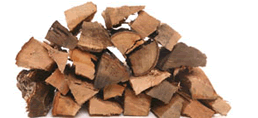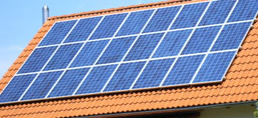Grants
Isn't there a lot of smoke? What If I live in a smokeless zone?
Wood fuel boilers typically run at very high efficiencies (90%+) this means that the fuel is converted into heat very effectively and very few smoke particles are produced. In a properly installed and fuelled boiler most of what comes out of the chimney is steam.
The vast majority of wood fuelled boilers are fine to install in smoke free areas. Legally though they need to be on a certified list held by the council. Boilers which do not appear on this list are not legal to install at the moment, though councils are able to make one off exemptions. There are also recommendations that have been submitted for the law to be changed. So watch this space!
Are there any grants available?
Grants are available to install biomass boilers. Different grants are available depending on your solar panel installation situation. Contact us for more information or look at out links page
What about the ash? Will I be emptying it all the time?
Wood fuelled boilers typically produce less than 1% ash (it is often much less than this). In real terms on a small-medium sized system this means emptying a bucket once every two weeks or so. Wood ash isn't hazardous waste, in fact it is a low nitrogen fertiliser so instead of throwing it away you can put it on the roses!
What about planning permission?
Planning permission depends greatly on your location, though the benefits of a biomass system mean that is easier to get permission than many other renewable systems.
Wood fuelled boilers can be sited outside the building they serve and connected either to one or several buildings by a hot water main.
If boilers are installed within a building, the existing chimney can often be used instead of erecting a new one. If done correctly then the impact on the outside of the building is negligible. This means that wood fuelled systems are often a really good option for listed buildings.
What They Say about new energy...
- DECC Confirm Contingency Plan
- New energy efficiency rating for homes highlights need for proper valuations of houses
- Do you wish to harness an income from your land with solar panels?
A call for commitment from the Government re: EU renewables target
Government needs to do more to remind the public it has not killed the FIT
The need for real data to prove renewable technology’s worth
Feed-in-tariff is not dead!
Pros & Cons of The Green Deal.
The Green Deal is coming, but what does it mean?
Time is running out for 50kwp solar systems at the top rate of feed in tariff
- Recyclable Items
- Rainwater Harvesting
- Feed In Tariff
- Challenge of being green
- Greener together
- Greener Living
- Wind Energy
- Solar panel installation
- Project Facilitator
- Green Fuel
- Grants
- Burning coal
- Wales Plans for Energy
- Energy Saving Cardiff
- Central Heating Issues
- Climate Change
Events 2024
'Social enterprise and the environment' event June 25, 2024
THIS WEBSITE WILL HELP YOU FIND PUBLICLY FUNDED SUPPORT AVAILABLE IN WALES FOR ENERGY EFFICIENCY AND SMALL-SCALE RENEWABLE ENERGY.
Save Up To 80% On Your Household Bills
FREE Training - how will climate change affect your community? June 25, 2024
Greener Living Fund launch - first pictures June 25, 2024
Wood Energy
Greener Living Programme launched June 23, 2024
The third sector gave us the welfare state, can it give us the sustainable state? June 22, 2024
UK Climate Projections launched (significant!) June 18, 2024
Funding Central launched June 17, 2024
Third Sector Climate Change Declaration June 15, 2024
Real Help for Communities: Volunteers, Charities and Social Enterprises June 7, 2024
The sun is inexhaustible. It will never run out meaning free energy for you forever Film June 5, 2024.
Comparing UK Solar Panel Installers could
Save Up To 65%
 Save Money
Cut your electricity bill by 70%.
Earn Money
Earn over £800 per year with the feed in tariff.
Accredited Companies
We only deal with certified installers.
Quick and Easy
It might be worth talking to a number of different companies. One we have found helpful and consistently delivering high results in the commercial industry is Enviko, but please be your own judge.
Save Money
Cut your electricity bill by 70%.
Earn Money
Earn over £800 per year with the feed in tariff.
Accredited Companies
We only deal with certified installers.
Quick and Easy
It might be worth talking to a number of different companies. One we have found helpful and consistently delivering high results in the commercial industry is Enviko, but please be your own judge.
UK Solar PV Benefits & Savings
Solar PV Cost/Savings example
This example is based on a 50kwp system with 30 degree pitch in Swindon with no grid upgrades and straight forward access. (2010)
System size: 50 kW
System cost: £75,000 +VAT
Income from FiT: £225,822 (assuming 3% RPI increase on 15.2p/kWh tariff)
Energy Savings: £106,142 (assuming unit cost = 11p/kWh)
Export Tariff Income: £15,469 (assuming inflation of 5%)
Total Profit (exc. install cost): £272,433
Benefits of Solar PV systems
- Lower electricity bills
- Cut carbon emissions
- Benefit from Feed-in-tariff for 25 years
- Cut carbon emissions
- Improve efficiency of building
- Sell electricity back to the grid to earn the Export tariff
Solar PV for Farmers
Solar can help farmers reduce energy costs and generate income at the same time. A solar PV installation can substantially reduce energy costs, especially for farms running power-hungry equipment during daylight hours. Through the feed-in-tariff you can expect a return on investment of around 8% for a 25 year period, plus the savings on your electricity costs.
As a Solar PV specialist and accredited installer since 2004, we can help expedite planning applications and complete fit outs on permitted developments quickly and efficiently.
Energy Saving 2024
The difficulty of engaging with people has meant that Bryony isn’t sure how accurately they’re sticking to their pledges. “I’m hoping that the new scheme where you can make your own pledges will improve things” she says. “It’s a good move for this audience where people are probably already doing some of the standard pledges”. 
Wood Burning Energy?
The renewable energy industry in Wales is providing the potential for new Wood Energy Businesses to be established by entrepreneurial individuals or co-operatives. www.woodenergybusiness.co.uk A Wood Energy Business will need: 1. A guaranteed, local supply of wood or processed wood fuel 2.

Solar Power
The Government has set targets for the number of UK households that will have installed solar panels to their home. Contrary to popular believe the UK has over 65% of the radiation that Spain receives which is more than enough to guarantee a the function of a Solar PV system. With the Government's feed-in tariff in place that allows an income to be produced from installing solar energy the number of homes that rely soley on solar power is set to rise.


